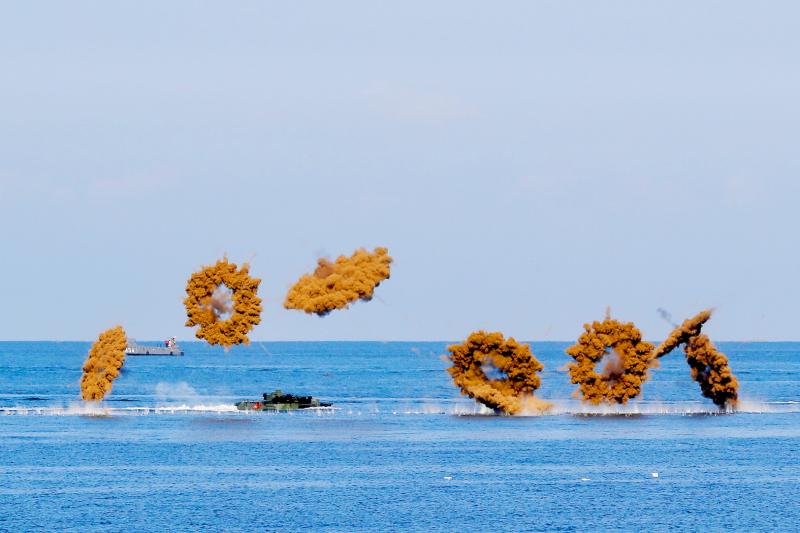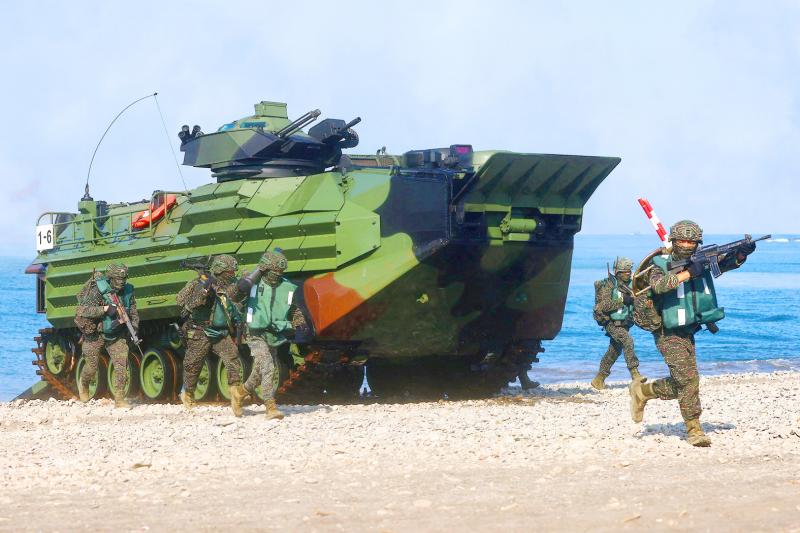The military yesterday deployed a drone and several vehicles to drop leaflets and broadcast messages in a psychological warfare drill as part of the Han Kuang exercises.
During the drill in Taoyuan, a psychological warfare task force from the Political Warfare Bureau dispatched a drone to scatter leaflets, while trucks broadcast video and audio propaganda to boost the morale of Taiwanese soldiers amid a simulation of an invasion by China.
A military truck blared sound effects of fighter jets flying by, shells dropping and tanks rolling, a strategy to distract and confuse the enemy on the battlefield, the Ministry of National Defense said.

Photo: RITCHIE B. TONGO, EPA-EFE
Cognitive warfare, disinformation campaigns and rumor-spreading have become a major part of modern warfare, alongside conventional kinetic warfare, the ministry said.
The main purpose of psychological warfare is to counter such campaigns and create fear among the enemy, thus weakening its will to fight, it said.
The bureau’s special task force is capable of creating and broadcasting audio and video propaganda material, and dropping flyers within 30 minutes of receiving an order to do so, the ministry said.

Photo: Ann Wang,
Yesterday’s drill’s were part of the live-fire component of the 38th edition of the annual Han Kuang exercises.
The exercises, which test the country’s combat readiness in the event of a Chinese invasion, began on Monday morning and are to conclude today.
In other Han Kuang drills yesterday, the 99th Marine Brigade held a joint landing operation at a beach in Pingtung County’s Fangshan Township (枋山).
Using boats and amphibious assault vehicles, special troops made a landing at the beach, covered by friendly air and sea forces, the ministry said.
In Miaoli County, reservists undergoing extended training under the 302nd Infantry Brigade simulated fending off an attempted beach landing by enemy forces.
CM34 and CM32 armored vehicles from the 586 Armored Brigade were deployed to repel the “invaders.”

The Taipei City Government yesterday said contractors organizing its New Year’s Eve celebrations would be held responsible after a jumbo screen played a Beijing-ran television channel near the event’s end. An image showing China Central Television (CCTV) Channel 3 being displayed was posted on the social media platform Threads, sparking an outcry on the Internet over Beijing’s alleged political infiltration of the municipal government. A Taipei Department of Information and Tourism spokesman said event workers had made a “grave mistake” and that the Television Broadcasts Satellite (TVBS) group had the contract to operate the screens. The city would apply contractual penalties on TVBS

A new board game set against the backdrop of armed conflict around Taiwan is to be released next month, amid renewed threats from Beijing, inviting players to participate in an imaginary Chinese invasion 20 years from now. China has ramped up military activity close to Taiwan in the past few years, including massing naval forces around the nation. The game, titled 2045, tasks players with navigating the troubles of war using colorful action cards and role-playing as characters involved in operations 10 days before a fictional Chinese invasion of Taiwan. That includes members of the armed forces, Chinese sleeper agents and pro-China politicians

The lowest temperature in a low-lying area recorded early yesterday morning was in Miaoli County’s Gongguan Township (公館), at 6.8°C, due to a strong cold air mass and the effect of radiative cooling, the Central Weather Administration (CWA) said. In other areas, Chiayi’s East District (東區) recorded a low of 8.2°C and Yunlin County’s Huwei Township (虎尾) recorded 8.5°C, CWA data showed. The cold air mass was at its strongest from Saturday night to the early hours of yesterday. It brought temperatures down to 9°C to 11°C in areas across the nation and the outlying Kinmen and Lienchiang (Matsu) counties,

STAY VIGILANT: When experiencing symptoms of carbon monoxide poisoning, such as dizziness or fatigue, near a water heater, open windows and doors to ventilate the area Rooftop flue water heaters should only be installed outdoors or in properly ventilated areas to prevent toxic gas from building up, the Yilan County Fire Department said, after a man in Taipei died of carbon monoxide poisoning on Monday last week. The 39-year-old man, surnamed Chen (陳), an assistant professor at Providence University in Taichung, was at his Taipei home for the holidays when the incident occurred, news reports said. He was taking a shower in the bathroom of a rooftop addition when carbon monoxide — a poisonous byproduct of combustion — leaked from a water heater installed in a poorly ventilated